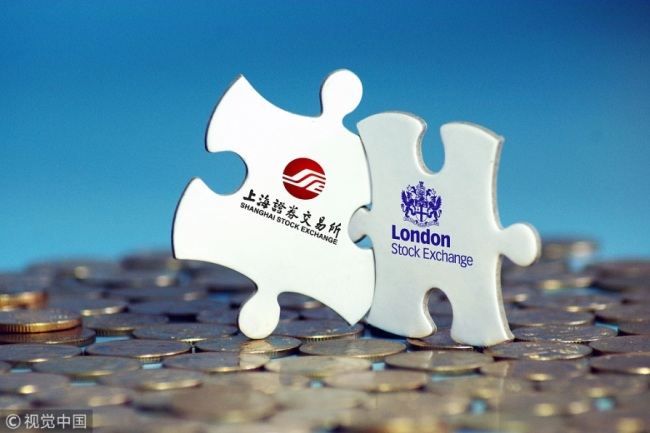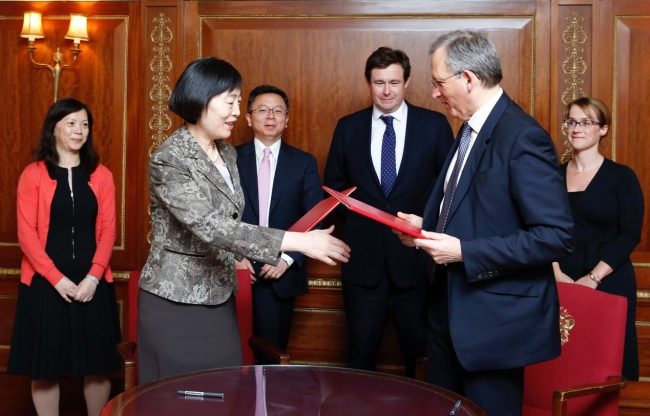
Opinion
15:28, 21-Feb-2019
Why Britain should hold onto its leading position in RMB trading?

Editor's Note: The following is an edited translation of a commentary from the Chinese-language "Commentaries on International Affairs" published on China Plus on February 20, 2019.
Against a backdrop of increasing downward pressure on the Chinese economy and ongoing uncertainties in Sino-U.S. trade talks, there has been unremitting badmouthing of China's currency, the renminbi (RMB), on the international capital markets apart from in the traditional financial powerhouse, Britain.
According to a Bank of England survey, the volume of RMB trading in London last year exceeded pound-against-euro trading, which has helped strengthen London's position as the world's largest foreign exchange trading center, in spite of the country being deeply bogged down in the Brexit mire. If London can keep its tight grip as a leader in RMB offshore trading, the negative effect caused by Brexit could be largely offset.

VCG Photo
VCG Photo
London, the world's largest foreign exchange center, was a comparative latecomer and the first bid to become a leading center for offshore RMB trading in 2012, following in the footsteps of Singapore, Paris, Frankfurt and Luxemburg.
But it quickly overtook Singapore, the world's first offshore RMB trading center, and Frankfurt, the first offshore RMB trading center in Europe, to become the biggest hub for offshore trading of the Chinese currency.
This was helped by a big increase in the number of UK-China cross-border economic and trade transactions being settled directly in RMB. In the first eight months of last year, the actual payment of China-UK cross-border transactions in RMB totaled 250 billion yuan (around 37 billion U.S. dollars), 2.5 times the volume reached a year before. Over one-fifth of bilateral trade of goods was settled in RMB.
Britain's decision to expand RMB usage comes as no surprise.

Deputy Governor of the People's Bank of China, Hu Xiaolian (foreground center left), and Deputy Governor of the Bank of England John Cunliffe (center right), prepare to exchange signed MOU on renminbi clearing and settlement in London on Monday, March 31, 2014. /AP Photo
Deputy Governor of the People's Bank of China, Hu Xiaolian (foreground center left), and Deputy Governor of the Bank of England John Cunliffe (center right), prepare to exchange signed MOU on renminbi clearing and settlement in London on Monday, March 31, 2014. /AP Photo
On the one hand, RMB-denominated bonds held by overseas investors stood at 1.5 trillion yuan by the end of last year, two-fifths of which was a new investment made in 2018. On the other hand, since the Chinese currency was officially included into the International Monetary Fund (IMF) Special Drawing Rights currency basket in October 2016, an increasing number of countries and multinational enterprises have adopted RMB for payment and settlement.
Over 60 countries and regions have included RMB in their foreign exchange reserves, and dozens of countries have signed currency swap agreements with China. Additionally, China and Britain are pushing for bilateral tools such as the Shanghai-London Stock Connect mechanism, a cross-listing program between the exchanges in Shanghai and London, to facilitate direct financing on each other's capital market.
The steady internationalization of the Chinese currency has made it perfectly natural for Britain to increase the level of RMB settlement.
London's position as the leading global financial center is under enormous threat due to the uncertainties that may be triggered by Brexit. But as long as it maintains its dominance in offshore RMB trading, such concerns could be greatly reduced as the stability of the value of the RMB is constantly improving and the prospects of RMB internationalization are becoming more promising, backed by China's huge forex reserves and increasing comprehensive national strength.
(If you want to contribute and have specific expertise, please contact us at opinions@cgtn.com)

SITEMAP
Copyright © 2018 CGTN. Beijing ICP prepared NO.16065310-3
Copyright © 2018 CGTN. Beijing ICP prepared NO.16065310-3